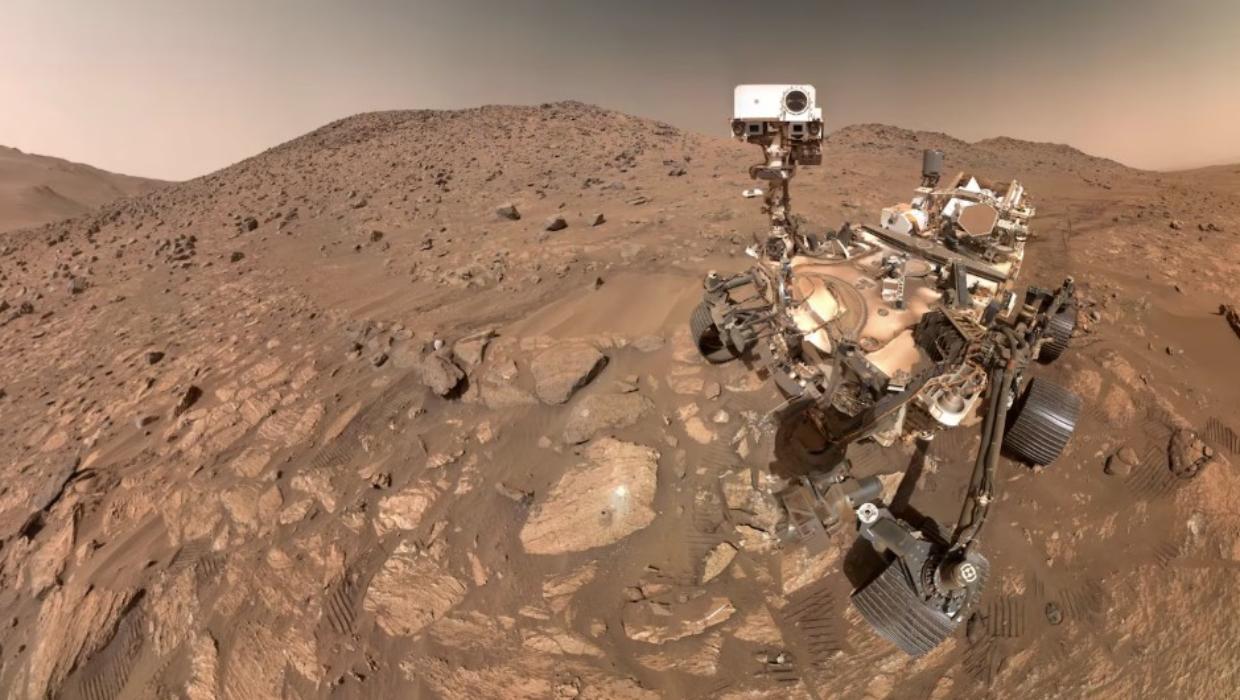Science
NASA’s Perseverance Rover Uncovers Potential Sign of Life on Mars

NASA has made a significant discovery on Mars, identifying what scientists describe as a “potential biosignature.” Detailed analysis of images captured by the Perseverance Rover has revealed speckled rocks that could indicate past microbial life on the planet.
The findings stem from investigations conducted in the Jezero Crater, a site believed to have once housed a lake. The rover collected high-resolution images of the rocks during its exploration, and researchers have noted unusual patterns that could suggest biological activity. This discovery marks a pivotal moment in the ongoing quest to understand whether life ever existed beyond Earth.
The term “biosignature” refers to any substance, such as organic molecules or structures, that provides evidence of past life. In this case, the speckled rocks exhibit characteristics that warrant further examination. NASA scientists are enthusiastic about the implications of this finding, as it could reshape our understanding of Mars’ history and its capacity to support life.
According to Dr. Ken Farley, a project scientist for the Perseverance mission, “While we cannot yet confirm that these patterns are the result of biological processes, they are the clearest indicators we have found so far.” This cautious optimism reflects the broader scientific approach to interpreting potential evidence of past life.
The Perseverance Rover landed on Mars in February 2021, tasked with exploring the planet’s geology and searching for signs of ancient life. Since then, it has been traversing the Martian landscape, collecting samples and sending data back to Earth for analysis. The rover’s advanced instruments allow for detailed investigations that were not possible in previous missions.
NASA plans to conduct further analyses of the rocks in the coming months, utilizing both the rover’s onboard capabilities and additional laboratory techniques on Earth. The goal is to determine the exact nature of the speckled rocks and whether they can indeed be classified as biosignatures.
This discovery has sparked excitement within the scientific community and among space enthusiasts worldwide. As researchers continue to analyze the data, the possibility of confirming the existence of life on another planet remains tantalizingly close.
As we look ahead, the findings from Mars could have profound implications for future exploration and our understanding of life in the universe. The Perseverance Rover’s mission exemplifies humanity’s enduring curiosity and desire to explore the unknown, pushing the boundaries of what we know about our cosmic neighborhood.
With each new discovery, the mystery of Mars deepens, leaving scientists eager to unravel the secrets hidden beneath its surface. The journey of exploration is far from over, and the potential for groundbreaking revelations remains high as NASA continues its quest on the Red Planet.
-

 World3 weeks ago
World3 weeks agoPrivate Funeral Held for Dean Field and His Three Children
-

 Top Stories3 weeks ago
Top Stories3 weeks agoFuneral Planned for Field Siblings After Tragic House Fire
-

 Sports3 months ago
Sports3 months agoNetball New Zealand Stands Down Dame Noeline Taurua for Series
-

 Entertainment3 months ago
Entertainment3 months agoTributes Pour In for Lachlan Rofe, Reality Star, Dead at 47
-

 Entertainment2 months ago
Entertainment2 months agoNew ‘Maverick’ Chaser Joins Beat the Chasers Season Finale
-

 Sports3 months ago
Sports3 months agoSilver Ferns Legend Laura Langman Criticizes Team’s Attitude
-

 Sports1 month ago
Sports1 month agoEli Katoa Rushed to Hospital After Sideline Incident During Match
-

 World4 weeks ago
World4 weeks agoInvestigation Underway in Tragic Sanson House Fire Involving Family
-

 Politics2 months ago
Politics2 months agoNetball NZ Calls for Respect Amid Dame Taurua’s Standoff
-

 Top Stories3 weeks ago
Top Stories3 weeks agoShock and Grief Follow Tragic Family Deaths in New Zealand
-

 Sports2 weeks ago
Sports2 weeks agoEli Katoa Shares Positive Recovery Update After Brain Surgery
-

 Entertainment6 days ago
Entertainment6 days agoJacinda Ardern Discusses Popularity Decline on Graham Norton Show





















